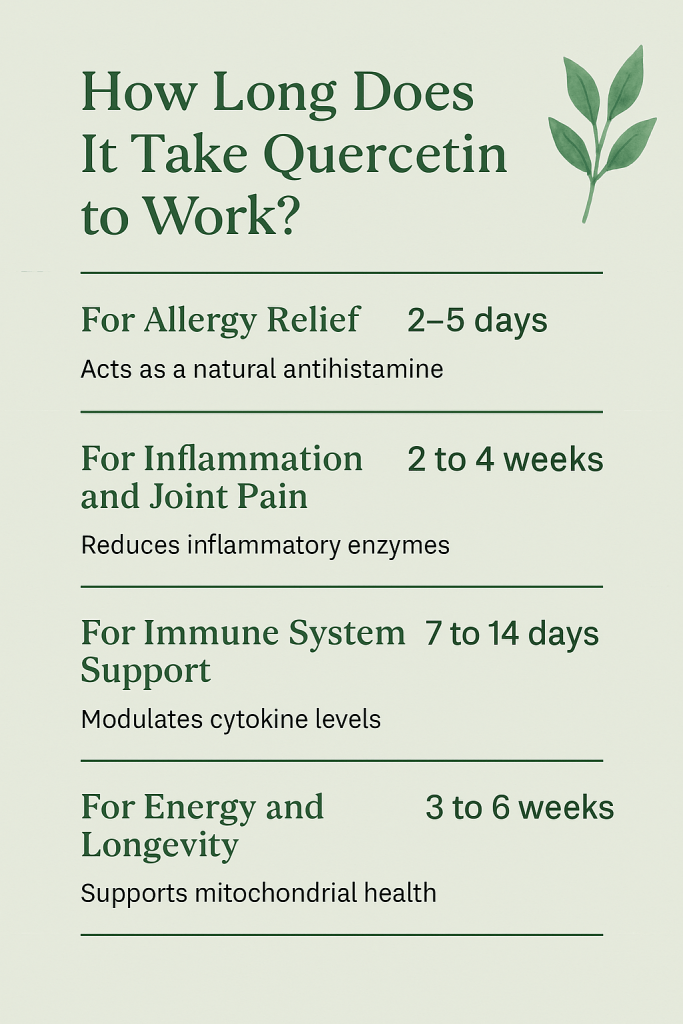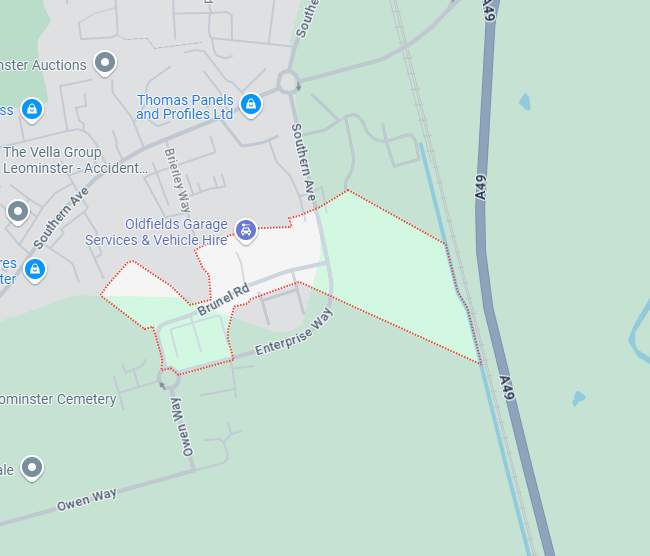How Long Does It Take Quercetin to Work?
Quercetin is a plant-based flavonoid that’s been making waves in the world of natural wellness. Known for its antioxidant, anti-inflammatory, and antihistamine properties, it’s found in foods like apples, onions, and green tea. But when taken as a supplement, how long does it take quercetin to work? That’s what we’ll explore in this article—along with how to get the most out of this powerful compound.
Whether you’re using it for immune support, allergy relief, or overall inflammation, the timeline for quercetin’s effects can vary. Let’s break it down.
How Long Does It Take Quercetin to Work? – What Exactly Is Quercetin?
Quercetin belongs to a group of plant pigments known as flavonoids. These compounds are responsible for the vibrant colours in fruits and vegetables. More importantly, they also act as potent antioxidants, helping to neutralise free radicals and protect your cells from damage.
Although your body doesn’t produce quercetin on its own, you can get it from a varied diet or by taking a concentrated supplement. In supplement form, quercetin is often paired with bromelain (an enzyme from pineapple) or vitamin C to enhance absorption.
How Long Does It Take Quercetin to Work in the Body?
Let’s get to the heart of the question: how long does it take quercetin to work once you start supplementing?
The answer depends on what you’re using it for. Generally speaking, quercetin begins to enter the bloodstream within 30 to 60 minutes after ingestion. However, the noticeable effects will vary based on your body’s needs and what issue you’re trying to address.
Here’s a general breakdown:
1. For Allergy Relief
Many people turn to quercetin during allergy season because it acts as a natural antihistamine. It stabilises mast cells, which prevents them from releasing histamine—your body’s primary chemical response to allergens.
How long it takes: Most users report improvements in symptoms like sneezing, runny nose, or itchy eyes within 2–5 days of consistent use. In some cases, benefits may be noticeable within 24 hours, especially when combined with bromelain or vitamin C. So if you’re asking how long does it take quercetin to work for allergies, you might feel relief sooner than expected.
2. For Inflammation and Joint Pain
Quercetin’s anti-inflammatory properties make it popular among people dealing with joint stiffness or inflammatory conditions such as arthritis. It helps by reducing the activity of inflammatory enzymes and downregulating certain immune responses.
How long it takes: It often takes between 2 to 4 weeks to notice real changes in inflammation and joint comfort. Consistency is crucial, as the effects are cumulative over time. If you’re wondering how long does it take quercetin to work on chronic pain, patience and daily use are key.
3. For Immune System Support
Quercetin also supports immune health by modulating cytokine levels and protecting cells from oxidative damage. It’s often included in immune-boosting stacks, especially during winter or flu season.
How long it takes: For general immune support, most people start to feel a difference in 7 to 14 days, particularly when taken daily alongside zinc and vitamin C. That said, how long does it take quercetin to work for immunity can vary based on your current health status.
4. For Energy and Longevity
Although not its most common use, some people take quercetin for mitochondrial health and long-term energy. It’s thought to support cellular performance and slow down age-related oxidative stress.
How long it takes: These effects are usually more subtle and long-term. You may notice an increase in daily energy or mental clarity after 3 to 6 weeks of regular supplementation. Therefore, if you’re tracking how long does it take quercetin to work for energy, keep an eye on your baseline over time.
What Affects Quercetin’s Speed and Effectiveness?
Now that we’ve addressed how long does it take quercetin to work, it’s important to understand that individual results may vary. Several factors can affect how quickly quercetin works:
-
Dosage: Most studies use doses between 500mg to 1,000mg per day. Lower doses may still be effective but take longer.
-
Bioavailability: On its own, quercetin is not easily absorbed. However, combining it with bromelain or vitamin C enhances absorption significantly.
-
Diet and Lifestyle: A healthy, anti-inflammatory diet and adequate hydration can amplify quercetin’s benefits.
-
Underlying Health Conditions: Chronic issues like gut imbalance or inflammation may slow absorption or delay noticeable effects.
How to Take Quercetin Correctly
To get the most out of quercetin, timing and form matter. Here are a few practical tips:
-
Take it with food: This improves absorption and reduces the risk of an upset stomach.
-
Pair it wisely: Look for supplements that include bromelain, vitamin C, or zinc, all of which help improve its bioavailability.
-
Stick with it: Although some people feel results quickly, others need to stay consistent for several weeks before benefits fully appear.
If you’re still asking yourself how long does it take quercetin to work, these tips will help speed things along.
Are There Any Side Effects?
Generally, quercetin is well-tolerated when taken at recommended doses. Mild side effects may include headaches or digestive discomfort, especially if taken on an empty stomach. However, these effects are rare and usually short-lived.
It’s always best to consult your healthcare provider if you’re taking medications or have underlying conditions, just to be safe.
What Does the Research Say?
There’s growing research supporting quercetin’s effects on inflammation, immune modulation, and histamine control. Clinical trials have demonstrated its potential in reducing allergy symptoms, managing oxidative stress, and even improving lung health. While more long-term studies are needed, current evidence points toward its wide-ranging benefits.
Final Thoughts: How Long Does It Take Quercetin to Work?
So, how long does it take quercetin to work? For many people, it starts acting within the first hour, but visible results often take a few days to several weeks—depending on the purpose. Whether you’re hoping to ease allergies, boost your immune system, or reduce inflammation, quercetin can be a powerful and natural addition to your health routine.
To see the best results, choose a high-quality product, stay consistent, and pair it with complementary nutrients. Your body will thank you—with time.
When using antioxidant supplements, it helps to understand how they fit into daily routines that support steady energy and balance. Compounds such as quercetin are often taken consistently rather than for immediate effects, as they work alongside the body’s natural processes over time. This approach aligns well with Natural Energy Supplements | Daily Vitality & Balance, which explores how supportive nutrients can contribute to everyday wellbeing when used as part of a balanced lifestyle.





